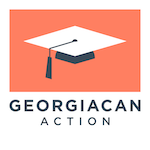GeorgiaCAN Action is a grassroots collective of community members, parents and policy experts focused on ensuring that we have strong leaders, strong policies and a strong understanding of impact in improving the educational landscape for kids in Georgia.
As part of our endorsement process for the 2022 legislative elections we are asking candidates to complete the following candidate questionnaire. We do not usually release results publicly but do reserve the right to do so. Since it is impossible for our supporters to meet every candidate personally, the questionnaire is critical for us in working with our supporters to choose the candidates we will endorse. Rest assured we will be a strong voice in support of those we endorse.
If you would like to expand on any answers or subjects, we strongly encourage you to use the “Comments” section at the end of the survey.
If you have any questions please contact Executive Director Michael O’Sullivan at 770-235-4749.
